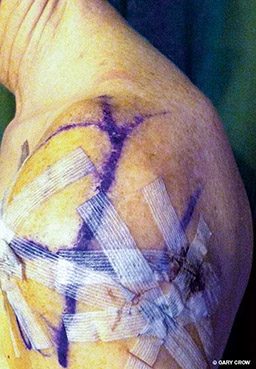My husband, Gary, and I have a love affair with Bonaire, in part because of the abundance of shore diving opportunities. On day 12 of a recent two-week trip we had the chance to do a guided night dive at the island’s famous salt pier.
The shore at the salt pier is a combination of sand patches and scattered smooth coral stones. As we began setting up our tanks I noticed the surf was considerably higher than it had been in previous days. I told Gary that we would need to be careful entering.
We geared up and started into the water, carefully picking our way over the stones by feel. At least one 3-foot wave rolled through while we were still in shallow water, but Gary and I braced each other and attempted to move quickly into deeper water.
Just as we reached hip-deep water, the guide called out that a big wave was coming. Gary and I turned in a way we thought would be perpendicular to the wave, stood with our feet apart and braced each other with both arms. Seconds later a 5- or 6-foot-high wave crashed over our heads, sending us both tumbling toward shore. The next thing I knew my face was in the sand and water, and I felt extreme pain in my left shoulder. As I lifted my face I realized I could not use my left arm to get up. I was trapped in the surge by the weight of the gear on my back as the next two waves rolled over me.
I managed to shout that my shoulder was out. Gary and the guide were instantly at my side, lifting me and helping me to shore. The guide asked a few questions and had me move my left arm. He said he thought my shoulder may have dislocated but slipped back into place since the pain was subsiding.
He advised us to go to the emergency room in town, but all aI could think about was that if we went there they would cut off my wetsuit. I convinced Gary and the guide that I was OK, just cold.
Removing my wetsuit back at our condo proved challenging, but we managed. Gary asked if we should call DAN®. The idea felt similar to facing the destruction of my wetsuit at the hands of ER nurses: I feared someone at DAN would advise against diving in the last two days of our trip. Deciding that my situation was not life threatening, just uncomfortable, I opted instead to email DAN.
I dived those last two days, ignoring the email response from DAN recommending that I have my shoulder checked out at the local hospital.

After our return home, my shoulder became unstable; it felt like it was sliding in and out of place. My family doctor ordered X-rays and later an MRI, which revealed a rare fracture. He referred me to an orthopedic surgeon, who explained that shoulders normally dislocate forward. Mine had dislocated backward, most likely from a direct blow to the front of the shoulder. A second MRI, which involved an extremely painful injection of dye for contrast, showed tearing of the soft tissues in the joint, explaining the instability.
The orthopedist told me that the delays in treatment were now causing the joint to lock up, a common occurrence with shoulder injuries. The most disheartening news was that it would take a year to heal completely and that he would not clear me for diving until at least nine months postsurgery.
Surgery was the easy part. Afterward I had to wear an awkward sling/brace for four weeks, and I couldn’t lie down, not even for sleep. For three months I endured physical therapy three times a week to regain 70 percent range of motion, and it took another six months to achieve full range of motion.
I now realize that I made mistakes. Here is what I would have done differently:
- I would not have attempted a shore dive at an unfamiliar site with a rocky entry in complete darkness and rising surf. I no longer underestimate the force of a single wave.
- I would not have looped the straps of my fins over my wrist. The fins most likely twisted when the wave hit, wrenching and tearing my shoulder. I now do shore entries with my fin straps in my hand so that I can let go if necessary.
- I would have sought treatment at the emergency room on Bonaire as both our guide and DAN advised. I had no idea that shoulder dislocations often cause damage within the joint. My delay in seeking treatment may or may not have caused additional damage, but it most certainly caused additional pain.
- I would not have dived following the injury. Diving with any injury increases the potential for subsequent accidents.
The one thing I did right was having our DAN dive accident insurance in place before the trip. Once medical treatment began at home, DAN coordinated with my primary health insurance every step of the way, covering deductibles and copays quickly and painlessly.
© Alert Diver — Q2 Spring 2015